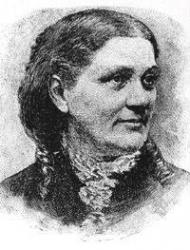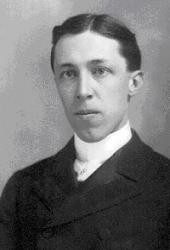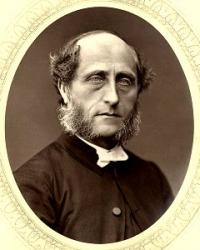Planning worship?
Check out our sister site, ZeteoSearch.org,
for 20+ additional resources related to your search.
- |
User Links
Person Results
Lucy Larcom

1824 - 1893 Author of "The Dawn of Day" in The Fellowship Hymn Book Larcom, Lucy, was born at Beverley Farm, Massachusetts, in 1826. Her Poems were published in 1864. Her hymn, "When for me the silent oar" [Death Anticipated), was published in 1868. She died in 1893.
--John Julian, Dictionary of Hymnology, Appendix, Part II (1907)
===============
Larcom, Lucy, p. 1576, ii. The extended use of this writer's hymns justifies a more detailed account of her life and work than is given on p. 1576. She was born in 1824, and worked from 1837-45 in the mills of Lawrence, Mass., then engaged in elementary teaching 1846-49, became a student at Monticello Female Seminary, Alton, Ill., 1849-52, and then entered upon advanced teaching in higher-class schools, and literary work. She edited with J. G. Whittier, Child Life in Poetry, 1871; Child Life in Prose, 1873; Songs of Three Centuries, 1875, &c. Her own works are Poems, 1869; Childhood Songs, 1875; Wild Roses of Cape Ann, 1881; Poetical Works, 1885; At the Beautiful Gate; And Other Songs of Faith, 1892. Her autobiography was published as A New England Girlhood. She died in 1893. In addition to "When for me the silent oar," of her hymns the following are in common use:—
i. From her Poems, 1869.
1. Hand in hand with angels. Angelic companion¬ship.
2. If the world seems cold to you.
3. When for me the silent oar. Death
ii. From her Wild Roses of Cape Ann, 1881.
4. In Christ I feel the heart of God.
5. O Spirit, "Whose name is the Saviour.”
in. From her Poetical Works, 1885.
6. Breaks the joyful Easter dawn, master.
7. Heavenly Helper, Friend Divine. Christ the Friend.
iv. From her At the Beautiful Gate, &c, 1892.
8. Draw Thou, my soul, O Christ. Looking to Jesus.
9. O God, Thy world is sweet with prayer. Prayer.
10. Open your hearts as a flower to the light.
11. King, happy bells of Easter time. Easter.
The above notes are from the British Museum copies of Miss Larcom's works.
--John Julian, Dictionary of Hymnology, New Supplement (1907)
Lucy Larcom
William Tidd Matson
1833 - 1899 Person Name: William Tidd Matson (1833- ) Author of "Expectant of my Lord's command" in The Hymnal of Praise Matson, William Tidd, was born at West Hackney, London, Oct. 17, 1833. He was educated first under the Rev. J. M. Gould, and then at St. John's College, Cambridge. Subsequently he studied under Professor Nesbitt, at the Agricultural and Chemical College, Kennington. In 1853 he underwent a great spiritual change. Leaving the Church of England, he first joined the Methodist New Connexion body, and then the Congregationalists. After the usual theological training, he entered the ministry, and held several pastorates, including Havant, Hants; Gosport; Highbury; Portsmouth, and others. His poetical works include:—
(1) A Summer Evening Reverie, and Other Poems, 1857; (2) Poems, 1858; (3) Pleasures of the Sanctuary, 1865; (4) The Inner Life, 1866; (5) Sacred Lyrics, 1870; (6) Three Supplemental Hymns, &c, 1872; (7) The World Redeemed, 1881, &c.
Several of Matson's hymns have been given in Allon's Supplemental Hymns; Horder's Congregational Hymns; The Baptist Hymnal; Dale's English Hymn Book.; Barrett's Congregational Church Hymnal, 1887, and others. The best known are:—
1. Father, of all, Whose wondrous power. Prayer to the Holy Trinity.
2. Glory, glory to God in the highest. Christmas.
3. God is in His temple. Divine Worship.
4. I'm but a little child. A Child's Prayer.
5. In whom shall I find comfort? God, the Source of Comfort.
6. Lord, I was blind, I could not see. Christ, the Life of Men.
7. O blessed Life, the heart at rest. Christ the Life of Men.
8. Teach me, O Lord, Thy holy way. Divine Guidance desired.
Mr Matson's hymns show a considerable mastery of the forms of hymnic expression, but are somewhat lacking in lyric energy. Those written for use with German chorales are excellent efforts, and rank with his best work. Taken as a whole his hymns are far above the average, and deserve wide acknowledgment. [Rev. W. Garrett Horder]
--John Julian, Dictionary of Hymnology (1907)
================
Matson, W. T, p. 719, ii. His "Glory to God in the highest, Shall be our song to-day" (Christmas) is in the Scottish Hymnal, 1884.
--John Julian, Dictionary of Hymnology, Appendix, Part II (1907)
=================
Matson, W. T. , p. 719, ii. He died in 1899. The hymn, "Glory to God in the highest, shall be our song to-day," p. 1591, i., is given to Mr. Matson in error. It is found in W. B. Bradbury's Golden Censer, 1864, p. 116, without authorship, and again in P. Phillips's Singing Pilgrim, 1866, p. 79, as by Mrs. E. H. Gates. [Rev. James Mearns, M.A.]
--John Julian, Dictionary of Hymnology, New Supplement (1907)
William Tidd Matson
Henry Ware

1794 - 1843 Person Name: Henry Ware, Jr. Author of "God Is A Spirit, Great And Just" in The Cyber Hymnal Henry Ware was born in Hingham, Massachusetts, in 1793. His father was a Unitarian minister; afterwards a Professor in Harvard College. Young Ware graduated at Harvard, studied theology, and became minister of the Second Unitarian Society, in Boston, in 1817. After a ministry of twelve years, he made a foreign tour, and on his return was elected "Parkman Professor of Pulpit Eloquence and Pastoral Theology" in Harvard College. In this position he obtained eminence. He died in September, 1843. His collected works in four volumes, were edited after his death, by the Rev. Chandler Robbins.
--Annotations of the Hymnal, Charles Hutchins, M.A., 1872
===================
Ware, Henry, D.D., son of Dr. H. Ware, pastor of the Unitarian congregation at Hingham, Massachusetts, and afterward Hollis Professor of Divinity at Cambridge, U.S.A., was born at Hingham, April 21, 1794. Before going to Harvard College, in 1808, he was under the care of Dr. Allyn, at Duxbury, and then of Judge Ware, at Cambridge. He graduated at Harvard in high honours, in 1812; and was then for two years an assistant teacher in Exeter Academy. He was licensed to preach by the Boston Unitarian Association, July 31, 1815; and ordained pastor of the Second Church of that city, Jan. 1, 1817. In 1829, in consequence of his ill health, he received the assistance of a co-pastor in the person of Ralph Waldo Emerson. In the same year Ware was appointed Professor of Pulpit Eloquence and Pastoral Care in the Cambridge Theological School. He entered upon his duties in 1830, and resigned in 1842. He removed to Framingham, and died there, Sept. 25, 1843. His D.D. degree was conferred upon Memoir, published by his brother John Ware, M.D., were numerous and on a variety of topics. He edited the Christian Disciple, which was established in 1813, and altered in title to the Christian Examiner in 1824, for some years before the change of title, and gave it his assistance subsequently. The Rev. Chandler Robbins collected his works and published them in four volumes, in 1847. His hymns, many of which are of more than usual excellence, are given in vol. i. Of these the following are in common use:
1. All nature's works His praise declare. Opening of an Organ. Dated Nov. 9, 1822. It is in Horder's English Congregational Hymns, 1884.
2. Around the throne of God The host angelic throngs. Universal Praise. Dated 1823, and printed in the Christian Disciple, vol. v., and in Putnam, 1874. A fine hymn of praise.
3. Father of earth and heaven, Whose arm upholds creation. Thanksgiving for Divine Mercies. Appeared in Cheever's American Common Place Book, 1831; and in Lyra Sacra Americana, 1868.
4. Father, Thy gentle chastisement. In Sickness. Dated March, 1836; and in Lyra Sacra Americana, 1868.
5. Great God, the followers of Thy Son. Ordination. Written for the Ordination of Jared Sparks, the historian, as pastor of the Unitarian Church, Baltimore,
1819. Given in Lyra Sacra Americana, 1868, and Putnam, 1874.
6. In this glad hour when children meet. Family Gatherings. Dated Aug. 20, 1835. In Lyra Sac. Americana, 1868, and Putnam, 1874.
7. Lift your glad voices in triumph on high. Easter. Dated 1817, and was published in the Christian Disciple of that year, in 2 stanzas of 8 lines. It is in Lyra Sac. Americana, 1868; Putnam, 1874, and numerous hymnbooks. Sometimes stanza ii. is given separately as, "Glory to God, in full anthems of joy."
8. Like Israel's hosts to exile driven. American National Hymn. Written for the Centennial Celebration of the Boston Thursday Lecture, Oct. 17,1833, and given in Lyra Sac. Americana, 1868, and Putnam, 1874. It is a quasi American National Hymn in praise of the Pilgrim Fathers.
9. 0 Thou in Whom alone is found. Laying Foundation Stone of a Place of Worship. In Lyra Sacra Americana, 1868, and Thring's English Collection, 1882.
10. 0 Thou Who on Thy chosen Son. Ordination. Written for an Ordination, March, 1829. In Putnam, 1874, and Dale's English Hymn Book, 1874.
11. Oppression shall not always reign. Against Slavery. "This was Mr. Ware's last composition in verse. It bears date March 15, 1843. In its original form it is longer than as presented here [in 3 stanzas of 8 lines], and is unsuited to a church-book. The following stanzas, taken from one of the Collections [stanzas i., ii. are in Longfellow and Johnson's Book of Hymns, 1848] are a part of the original, altered and transposed, and thus adapted to sacred worship."
12. To prayer, to prayer; for the morning breaks. Prayer. This poem of 10 stanzas of 6 lines is dated 1826, and is given in Lyra Sac. Americana, 1868, and Putnam, 1874. Two centos therefrom are in common use The first begins with stanza i., adapting it for Morning, and the second with stanza ii., "To prayer, for the glorious sun is gone," for Evening.
13. We rear not a temple, like Judah of old. Dedication of a Place of Worship. This is dated 1839, and is given in Putnam, 1874.
14. With praise and prayer our gifts we bring. Opening of a Place of Worship. In Dale's English Hymn Book. 1874.
With American Unitarians Dr. Ware ranks very high, and by them his hymns are widely used. [Rev. F. M. Bird, M.A.]
-- John Julian, Dictionary of Hymnology (1907)
==================
Ware, H., p. 1233, i. Another of his hymns in common use is "Great King of all, our nation's God" (National Humiliation). His hymn "To prayer, to prayer," is in Cheever's American Common-Place Book of Poetry, 1831.
--John Julian, Dictionary of Hymnology, Appendix, Part II (1907)
Henry Ware
Ferdinand Q. Blanchard

1876 - 1968 Author of "O Child of lowly manger birth" in Hymns of the Kingdom of God Blanchard was born on July 12 in Jersey City, NJ. He attended Amherst College (AB 1898) and Yale Divinity School (BD 1901). He was ordained as a Congregational minister and pastored churches in Southington, Connecticut (1901-04); East Orange, New Jersey (1904-15); and at the Euclid Avenue Congregational Church, Cleveland, Ohio, from 1915 until retirement. He died on July 2, 1968 in Cleveland Heights, Ohio.
Sources:
Hughes, p. 317
Reynolds, p. 253
Stuber, p. 396
NN, Hymnary. Source: http//www.hymntime.com/tch/bio/b/l/a/blanchard_fq.htm
Ferdinand Q. Blanchard
Austin C. Lovelace

1919 - 2010 Harmonizer of "MAINZER" in Great Songs of the Church (Revised) LOVELACE, AUSTIN C., AAGO: (1919-2010) D.S.M., Union Theological Seminary, New York. Recitals, workshops, festivals, lectures in 17 different denominations in 45 states as well as in Finland, Scotland, Canada, and New Zealand. Past President, Fellow, and Life member, HSUSC. 50 year member, Hymn Society of Great Britain and Ireland. Author of five books; co-editor and consultant of denominational and other hymnals. Longtime member, ASCAP. Composer of over 800 compositions published by 20 publishers. Organist for the 2nd Assembly of the World Council of Churches, 1954. Dean of the first North Carolina Chapter, AGO. Chairman of the 1968 National Convention, AGO, in Denver. Two terms on the National Council, AGO. Co-founder, with Tom Matthews, of the North Shore Chapter, AGO. Minister of Music Emeritus. Denver Chapter, AGO.
Austin C. Lovelace (from In Melody and Song, Darcey Press, 2014)
Austin C. Lovelace
Christopher Newman Hall

1816 - 1902 Person Name: C. Newman Hall Author of "We Pray For Those Who Do Not Pray" in The Cyber Hymnal Hall, Christopher Newman, LL.B., son of J. Vine Hall, was born at Maidstone, May 22, 1816, and educated at Totteridge School, and Highbury College, London. In 1841 he graduated B.A. at the University of London, and LL.B. in 1856. From 1842 to 1854 he was minister of Albion Church, Hull; and from 1854 he has been in charge of Surrey Chapel, and its continuation, Christ Church, Westminster. He was also chairman of the Congregational Union of England and Wales in 1876. In addition to several prose works, and numerous tracts (one of which, "Come to Jesus," has been translated into 30 languages and has reached a circulation of two millions), he published:—
(1) Hymns composed at Bolton Abbey, and Other Rhymes, Lond., Nisbet, 1858; (2) Cloud and Sunshine, Lond., Hamilton, Adams & Co., 1870; (3) Christ Church Hymnal, for the use of the Congregation of Christ Church, Westminster Road, Lond., Nisbet, 1876; (4) Pilgrim Songs in Sunshine and Shade, Lond. 1870 (this is No. 1 with additional verses); (5) Supplemental Pilgrim Songs; and (6) Songs of Earth and Heaven, Lond., Hodder & Stoughton, 1886.
In the Christ Church Hymnal, 1876, there are 82 original hymns by Mr. Hall, 10 of which previously appeared in his Hymns composed at Bolton Abbey, &c, 1858. All the 82 hymns are signed “N. H." Of his hymns the most popular are, "Accepting, Lord, Thy gracious call"; "Friend of sinners, Lord of glory"; and "Hallelujah, joyful raise" (q.v.). In addition the following are also in common use outside of his Hymnal:—
1. Come, Lord, to earth again (1876). Advent.
2. Day again is dawning (1872). Morning.
3. Friend of sinners, hear my cry (1844). Lent.
4. God bless our dear old England (1876). National Hymn.
5. I know who makes the daisies. Providence.
6. Lord, we do not ask to know (1876). Missions.
7. O Jesus, Who to favoured friend (1876). B. V. M. given into the charge of St. John. [Rev. W. Garrett Horder]
-- John Julian, Dictionary of Hymnology
=====================
Hall, C. N., p. 481, i. Several recent hymns are included in his Lyrics of a Long Life, 1894. The additional hymns which have come into use since 1890 include:—
1. Come to Jesus! Friend of sinners. [Jesus the Saviour.] Lyrics, 1894, p. 176. Previously in Congregational Sunday School, Supplement, 1891, and School Hymns, 1891, as "Come to Jesus! Mighty Saviour."
2. I want to live and be a man. [Manliness.] Lyrics, 1894, p. 240, headed "A Boy's Hymn." A response to "I want to be an Angel" [p. 559, i.]. Previously in School Hymns, 1891, No. 334.
3. I've wandered far from home. [The Prodigal.] Pilgrim Songs, 1871, p. 17; Christian Endeavour Hymnal, 1896.
4. Lord! we obey Thy kind command. [Repentance.] Lyrics, 1894, p. 193. Previously in School Hymns, 1891, No. 137, as "Lord! I obey."
5. 0 for the love, the perfect love. [Fearless Love.] Lyrics, 1894, p. 199. Previously in School Hymns, 1891, No. 482.
6. To David's Son, Hosanna. [Hosanna to Jesus.] In Christ Church Hymnal, 1876, No. 550, the Sunday School Hymnary, 1905, &c.
Mr. Hall died Feb. 18, 1902. [Rev. James Mearns, M.A.]
--John Julian, Dictionary of Hymnology, New Supplement (1907)
Christopher Newman Hall
Joseph F. Green, Jr.
1924 - 2013 Person Name: Joseph F. Green Author of "Thy Supper, Lord, Before Us Spread" in Great Songs of the Church (Revised) Joseph Franklin Green was born in 1924 in Waco, Texas. He obtained a B.S from Texas Wesleyan College, an M.A. from Baylor University and B.D., M.D. and Ph.D. from Southwestern Baptist Theological Seminary. He served in the Army during World War II, and then pastored Baptist churches in Texas and Colorado. For thirty years he was an editor at the Baptist School Board (LifeWay), and wrote many books and articles. He was also editor for the Grand Forks Herald in North Dakota, and then a pastor in the Presbyterian churches in Grandin and Hunter, ND. He died in Nashville in 2013.
Dianne Shapiro, from obituary, "The Tennessean, 14 Apr 2013, Sun, p. 86
Joseph F. Green, Jr.
Edward Hall Jackson
1838 - 1923 Person Name: E. Hall Jackson Author of "A thousand blessings on the place" in The Sunday School Hymnary Jackson, Edward Hall, son of a civil engineer, was born in Birmingham, April 12, 1838. In 1856 he joined a Baptist Church, and in 1859 became a Baptist minister. In that capacity he has laboured in Liverpool, Billesden (Leicestershire), Castle Donington, Ripley, and Louth; and as an occasional lecturer he has been widely popular. His hymns have been composed chiefly for Sunday School Anniversaries. Three were introduced into the Baptist Hymnal, 1879, and seven into the School Hymnal, 1880. The following are found in several Sunday School collections:—
1. A thousand blessings on the place. The Sunday School.
2. Brethren, we have found the Lord. Invitation to Church Fellowship.
3. Fearless, calm, and strong in love. Teachers' Meeting.
4. Hark for a voice to the children calling. Invitation Heavenwards.
5. How fair are the lilies, what fragrance they yield. Flower Services.
6. I have a work, 0 Lord. Teachers' Prayer.
7. Jesus, hear us for the young. Teachers' Prayer.
8. Little vessels on life's waters. Prayer for the Young.
9. Love each other, little children. Love and Patience.
10. Shall Jesus bid the children come? Children invited to Christ.
11. The golden land is shining. Heaven. [Rev. W. R. Stevenson, M.A.]
--John Julian, Dictionary of Hymnology (1907)
Edward Hall Jackson


 My Starred Hymns
My Starred Hymns


